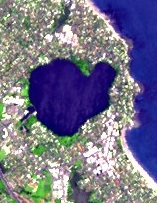
Sir Edmund Percival Hillary was a New Zealand mountaineer, explorer, and philanthropist. On 29 May 1953, Hillary and Nepalese Sherpa mountaineer Tenzing Norgay became the first climbers confirmed to have reached the summit of Mount Everest. They were part of the ninth British expedition to Everest, led by John Hunt.
The education system in New Zealand is a three-tier model which includes primary and intermediate schools, followed by secondary schools and tertiary education at universities and polytechnics. The academic year in New Zealand varies between institutions, but generally runs from early February until mid-December for primary schools, late January to late November or early December for secondary schools, and polytechnics, and from late February until mid-November for universities.

Judith Ngaire Tizard is a former New Zealand politician, and a member of the Labour Party.

Lake Pupuke is a heart-shaped freshwater lake occupying a volcanic crater between the suburbs of Takapuna and Milford on the North Shore of Auckland, New Zealand. The heart shape is a result of its formation by the linking of two circular craters - a larger one forming most of the lake and a smaller one forming the arm in the northeast. Separated from the sea by less than 200 m at one point, it has a circumference of about 4.5 km and reaches 57 m in depth. It is popular for recreational activities and the lakefront property around it.
North Harbour is a suburb of Auckland, New Zealand. It is located 12 kilometres north of the city centre, to the south of the suburb of Albany, close to the northern edge of the city.

Albany is one of the northernmost suburbs of the contiguous Auckland metropolitan area in New Zealand. It is located to the north of the Waitematā Harbour,

Albany Senior High School is a state coeducational senior secondary school situated in North Harbour, Auckland, New Zealand.
Epsom Girls Grammar School is a state secondary school for girls ranging from years 9 to 13 in Auckland, New Zealand. It had a roll of 2,200 as of 2012, including a number of boarders who live in nearby Epsom House, making it one of the largest schools in New Zealand.
Otahuhu College is a secondary school in Auckland, New Zealand for students years 9 to 13.
Oscar Vai To'elau Kightley, MNZM, is a Samoan-born New Zealand actor, television presenter, writer, director and comedian.
The provision of State Education in New Zealand developed from ideas about democratic and progressive education in the late nineteenth century. The creation of an education system that aimed to reduce inequalities and enable social mobility was an important goal for New Zealand's early educational reformists.
The Fifth Labour Government of New Zealand was the government of New Zealand from 10 December 1999 to 19 November 2008. Labour Party leader Helen Clark negotiated a coalition with Jim Anderton, leader of the Alliance Party and later the Progressive Party, and New Zealand First. While undertaking a number of substantial reforms, it was not particularly radical compared to previous Labour governments.
Albany Junior High School is a junior high school situated in North Harbour, Auckland, New Zealand.
De La Salle College is an integrated Catholic secondary boys' school in the south of Auckland, New Zealand. Established in 1953 by the De La Salle Brothers, it continues to educate young men in the Catholic faith and Christian values. It is one of two secondary schools established by the Brothers in New Zealand, the other being Francis Douglas Memorial College in New Plymouth. Students are encouraged to develop every aspect of their person and a strong emphasis is placed on excellence in academic study, cultural pride and sporting ability. Applicants need to be willing to support the Catholic character of the College.
Philip Dorling is a writer and journalist who has also served as an Australian public servant and political adviser. He is a Visiting Fellow at the School of Humanities and Social Science, University of New South Wales at the Australian Defence Force Academy.

Helen Elizabeth Clark is a New Zealand politician who served as the 37th Prime Minister of New Zealand from 1999 to 2008, and was the Administrator of the United Nations Development Programme from 2009 to 2017. She was New Zealand's fifth-longest-serving prime minister, and the second woman to hold that office.

The New Zealand Woman's Weekly is a weekly New Zealand women's magazine published by Bauer Media. As of 2011, it has a circulation of 82,040, third by paid sales after TV Guide and New Zealand Woman's Day.

The 2017 New Zealand general election took place on Saturday 23 September 2017 to determine the membership of the 52nd New Zealand Parliament. The previous parliament was elected on 20 September 2014 and was officially dissolved on 22 August 2017. Voters elected 120 members to the House of Representatives under New Zealand's mixed-member proportional (MMP) voting system, a proportional representation system in which 71 members were elected from single-member electorates and 49 members were elected from closed party lists. Around 3.57 million people were registered to vote in the election, with 2.63 million (79.8%) turning out. Advance voting proved popular, with 1.24 million votes cast before election day, more than the previous two elections combined.
The New Zealand Labour Party leadership election, 1993 was held to determine the leadership of the New Zealand Labour Party. The leadership was won by Mount Albert MP Helen Clark, who had been Deputy Leader of the party since 1989.

The Sixth Labour Government has governed New Zealand since 26 October 2017. It is headed by Labour Party leader and Prime Minister Jacinda Ardern.












